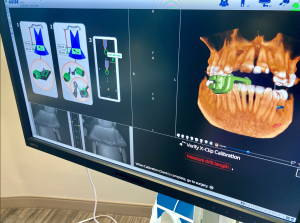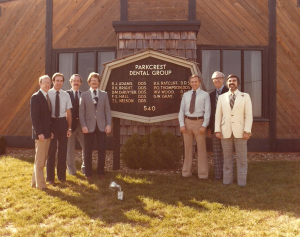If you’re brushing your teeth and notice a bit of blood after rinsing or flossing, it’s possible that your gums could be inflamed. Although the smallest amount of blood may not seem like a huge issue, it can develop into bigger problems over time, like gum disease and gingivitis. If you’re noticing bleeding when you brush, here are some things you should do to fix the problem.
Improve Your Oral Care
One of the biggest causes of bleeding gums has to do with plaque build-up around the gumline. When you don’t brush your gum line adequately, plaque can harden into tartar and continuously irritate your gums. Untreated issues can lead to advanced gum disease, more gum bleeding, and potentially serious issues with overall oral health
The best way to prevent your gums from bleeding is to prevent gum disease in the first place. You can do this by improving your oral care routine and making sure to brush several times a day. Always brush twice a day with fluoride toothpaste and floss at least once a day. Keeping your mouth in the best shape possible will lower your risk of gum disease and gum bleeding.
Examine Your Brushing Tools
If you notice gum bleeding even though you are brushing and flossing every day, it might be your dental tools. While all toothbrush bristles can do the job, many people falsely believe that harder bristles lead to a deeper clean. Hard bristled toothbrushes can actually irritate your gums, and they are no better at cleaning teeth. Soft-bristled toothbrushes are recommended for most people because they offer equally effective cleaning that is gentler on teeth and gums.
Flossing is another common cause of gum bleeding. If you haven’t been flossing consistently, try getting back on a once-a-day schedule. If you see some bleeding when you start flossing again, make sure to be gentle and don’t floss too hard.
Related Post: Bamboo Toothbrush: Advantages and Disadvantages
Eat a Healthy Diet
Foods that contain a lot of sugars and carbohydrates can increase your risk for tooth or other gum problems. Sugar creates the ideal environment for bacteria and plaque to form. Stick to a diet with whole grains and green vegetables, and limit your sugar intake. While you don’t have to completely cut sugar out of your life, be sure to brush after eating anything too sweet or sticky.
Related Post: Healthy Snacks for Braces Wearers
See Your Dentist
If you have a good daily dental care routine and you eat a healthy diet, recurring bleeding gums may be a sign of a more serious problem. Your dentist should examine your overall oral health to identify serious issues such as advanced gum disease. While occasional instances of bleeding gums may be no big deal, in other cases the situation can be very serious. It’s important to see a professional if you’re experiencing any gum discomfort or bleeding.
Contact Parkcrest Dental Group
Parkcrest Dental Group is here to make sure your teeth are always looking their best. If your gums become tender, swollen or start bleeding, it may be time to make an appointment. Contact our team at (417)887-1220 to schedule your first visit with us.





